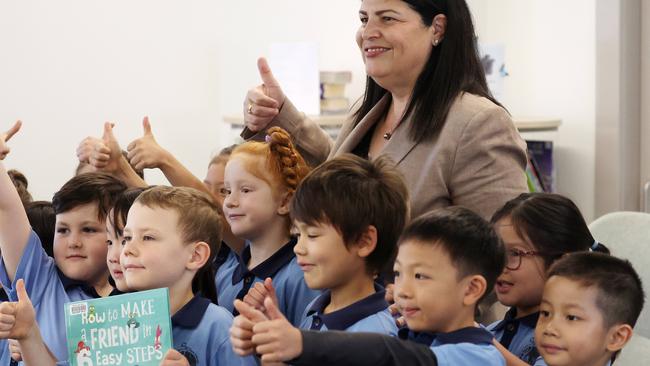Reading targets to be part of next school funding deal
Literacy experts have warned that Australia’s ‘wait to fail’ education system is leaving children unable to read or write.

A new reading check for children starting primary school will be fast-tracked in Queensland, as pressure grows to fix Australia’s “wait to fail’’ education system.
Queensland Education Minister Grace Grace on Monday announced $35m in funding for a “reading commitment’’ to guarantee that all children are taught to read well in primary school.
A phonics check, to test children’s knowledge of the alphabet and the building blocks of reading, will start for Year 1 students next year. Teachers and teacher aides will be given “master classes’’ in teaching children to read and write.
Ms Grace said Queensland would “strengthen our focus on phonics’’, reversing a longstanding policy of letting individual schools and teachers decide how to teach children to read, with many expecting students to memorise long lists of “magic words’’ without ever learning how to spell them out.
She said the Education Department would “upskill’’ ever teacher and teacher aide to ensure they knew how to teach phonics, using the explicit teaching of the sounds for each letter and groups of letters in a planned and logical order.
“We’re going to see a consistent evidence-informed approach to the effective teaching of reading right across our schools,’’ she said.
“Teaching reading is a particular skill. There will be an increased focus on teaching the vital components of reading in a particular order, and making sure teachers have access to the latest research to inform their teaching.”
The announcement will bring Queensland in line with South Australia, NSW and Tasmania in mandating the phonics check that was funded by the former Coalition government in 2018, in the face of a revolt from teacher unions that have long opposed phonics-based instruction.
The NSW government has also highlighted literacy as a priority in its new four-year plan for education, which embraces “explicit teaching’’, a back-to-basics instruction method opposed by teacher unions.
Federal Education Minister Jason Clare hailed the states’ long-awaited adoption of phonics-based reading instruction.
“The evidence is clear: phonics is critical,’’ he said.
Mr Clare flagged binding targets for states’ literacy and numeracy results, as a condition of federal funding through the next National School Reform Agreement, which sets the priorities for federal, state and territory spending.
“The current agreement lacks the real targets and practical reforms we need to tie funding to, that will help students to read, write and do maths,’’ he said. “The next agreement will fix this.’’
This year’s NAPLAN (National Assessment Program – Literacy and Numeracy) results showed that one in three students failed to meet minimum standards.
Australian students are now twice as likely to fail than to excel in maths and English.
Ms Grace said that literacy and numeracy were the “essential foundations’’ for learning throughout school.
“Being able to read is a fundamental life skill,’’ she said.
“It is a core to all learning, no matter the subject.’’
A group of 45 literacy experts signed an open letter to education ministers on Monday, demanding that all children’s literacy levels be screened at the start of primary school – as well as high school.
They warned that more than one million children in schools today did not have the literacy skills to “navigate the world with confidence, proficiency and dignity’’.
“Our education system is primarily focused on a ‘wait to fail’ model instead of on the development and implementation of preventive approaches,’’ the letter states.
“When children struggle to keep up with classroom learning, it can create a negative cycle where they lack understanding, become frustrated and disengage from learning, which can hinder learning opportunities.
“If teachers do not intervene quickly to help these students, even small learning gaps can grow and have devastating consequences as academic demands increase.’’
The experts include MultiLit director of strategy Jennifer Buckingham, Macquarie University’s emeritus professor of cognitive science, Max Coltheart, Knowledge Society chief executive Elena Douglas and University of Canberra assistant professor in speech pathology Jacqueline McKechnie.



